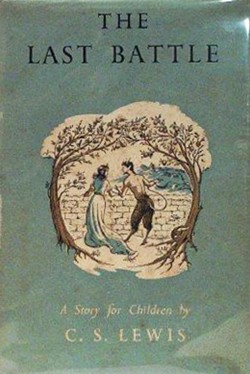Title: The Last Battle
Author: C.S. Lewis
Published: 1956
Ladies and gentlemen, I am 31 years old, and I have finally read each of C.S. Lewis' Chronicles of Narnia. I probably checked The Lion, the Witch and the Wardrobe out of my church's library a dozen times. I probably read it once as a kid. And though I looked at the covers of all the other books, and was intrigued, I never got them to give them a read.
And now I've made my way through all seven. Erynn said that she ranked The Last Battle somewhere near The Silver Chair. I have to disagree. This one was far better than The Silver Chair.
It's the story of Narnia's end. There are a lot of very obvious parallels with the biblical book of Revelation. We begin with an ape, named Shift, who has his donkey friend, Puzzle, masquerade as Aslan after they find an old lion skin in a pool. Puzzle is manipulated and made to do this against his will, while Shift forces the Narnians to do his bidding and causes them to question the true Aslan.
The last King of Narnia, Tirian, finds himself captive of the false leaders and cries out for help. That help arrives in the form of Eustace and Jill (from The Silver Chair). They set him free and join him in the final battle for Narnia's freedom.
In the end, the true Aslan reveals himself and ushers in the end of Narnia while welcoming true Narnians to a new Narnia. It's the very picture of the new Heaven and the new Earth as described in Revelation. I think Lewis does a great job in his attempt to describe the difference between the world we know now and the world that is to come. Compared to what will be, the world we know is merely a shadowy reflection.
I am going to ask a question, and please help me out with this in the comments. I haven't read much of C.S. Lewis' other work (though I really plan to eventually), but after reading this, I have to wonder something. Did he believe in a sort of "all roads lead to Heaven" theology? I only ask because of a particular scene near the end.
In the new Narnia, Aslan and the children from the previous books come across a Calormene (from the country to the south of Narnia). He asks how it could be that he would be in Aslan's Country when his whole life, he served Tash (the god of the Calormenes). Aslan told him that in serving Tash, he was really serving him. Every good thing that this man did in Tash's name, he was really doing in Aslan's.
The conclusion I draw from this is that Lewis believed that people of other religions, as long as they adhere to that system the way they should, then it's as good as accepting Christ. Maybe I'm misreading Lewis' intent here. But I always took Jesus' line of "No one comes to the Father except through me," kind of seriously. That's John 14:6, by the way. Like I said, I could be wrong in how I'm reading the novel. Help me out in the comments.
And now, I give you my list in order from favorite to least:
1. The Lion, the Witch and the Wardrobe
2. The Magician's Nephew
3. The Horse and His Boy
4. The Last Battle
5. Prince Caspian
6. The Voyage of the Dawn Treader
7. The Silver Chair

As C.S. Lewis is the patron saint of our household, I feel pretty good in stating that no, he did not believe that all roads lead to heaven. Check out "The Screwtape Letters" or, of course, "Mere Christianity" or "The Four Loves" for a clearer picture of his theology. I think, for the sake of a children's story (that I read yearly and love and get more out of every time I read it even at 31), he gave the good Calormenes a way out. Personally, I think it is Lewis' way of saying that there are good people out there who are not believers. See also Prince Caspian's ending. OH! Another great Lewis read is "Til We Have Faces" wich is fantastic twist on some Greek mythology.
ReplyDeleteYeah, that's always bothered me, too. Maybe that's part of the reason I didn't love it as much. And then, I just felt so frustrated that the Narnians were so easily taken in by the fake Aslan.
ReplyDeleteIt hurt me. But I do love the ending. "Farther up and farther in!"
But I agree with Rowena, I don't think it's a part of his theology in real life--which is why I never understood why he'd do that.
Well, when I finally get to have that dinner party where I invite three people living or dead, I'll be sure to ask him.